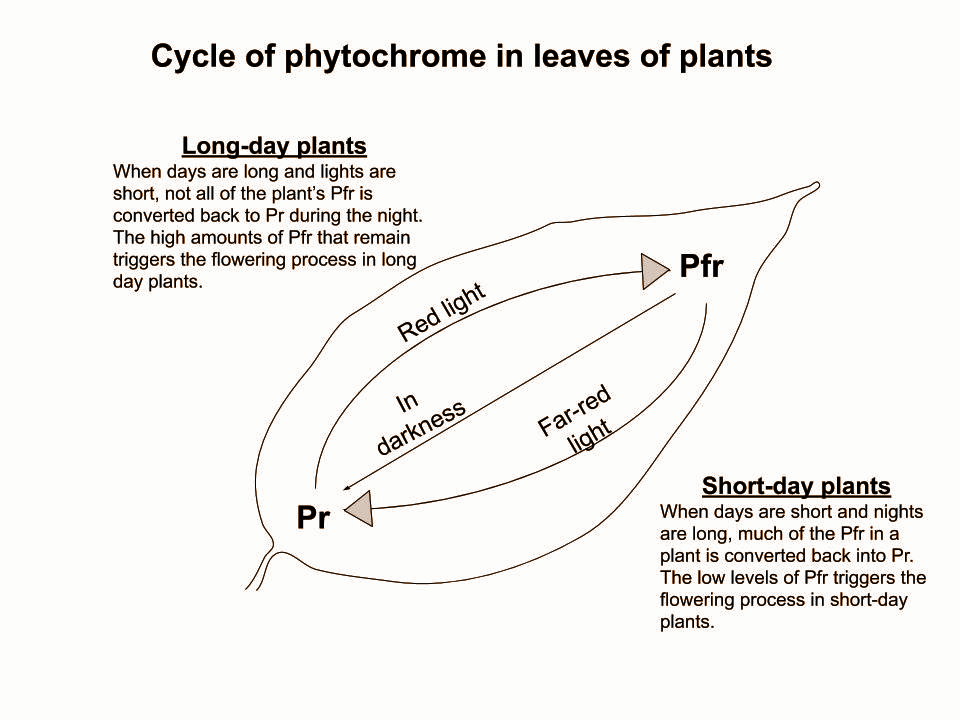
If the dark period is interrupted by flashes of light, a short day type plant will not flower.
A. True
B. False
C. Ambiguous
D. Data insufficient
Answer
565.8k+ views
Hint: Photoperiodism is the physiological reaction of plants in response to the length of the dark or night period. Based on photoperiodism plants are classified into long day plants, short day plants, and day neutral plants.
Complete answer: To sense, the seasonal change or change in photoperiod angiosperms have photoreceptor proteins such as phytochrome and cryptochrome. Phytochrome is of two forms they are \[{P_r}\] and \[{P_{fr}}\]. \[{P_r}\] is an inactive form and are \[{P_{fr}}\] is the active form. When a plant receives red light, the inactive form is converted into an active form. Red light is usually daylight. \[{P_r}\] stands for phytochrome in red light and \[{P_{fr}}\] stands for phytochrome in far-red light.
Short day plants flowers when the night lengths exceed their critical photoperiod. Long day plants flower when the night length falls below their critical photoperiod. Day-neutral plants do not depend on photoperiod for critical flowering. When the night span is interrupted by a light flash Short-day plants do not flower. So, the statement If the dark period is interrupted by flashes of light, short day type plant will not flower is a true statement.

Based on the above information the correct option for the given question is option A. true.
Note: Long day plants are also referred to as, short night plants, and short-day plants are referred to as, long night plants. Phytochromes are red light receptors whereas cryptochromes are blue light receptors.
Complete answer: To sense, the seasonal change or change in photoperiod angiosperms have photoreceptor proteins such as phytochrome and cryptochrome. Phytochrome is of two forms they are \[{P_r}\] and \[{P_{fr}}\]. \[{P_r}\] is an inactive form and are \[{P_{fr}}\] is the active form. When a plant receives red light, the inactive form is converted into an active form. Red light is usually daylight. \[{P_r}\] stands for phytochrome in red light and \[{P_{fr}}\] stands for phytochrome in far-red light.
Short day plants flowers when the night lengths exceed their critical photoperiod. Long day plants flower when the night length falls below their critical photoperiod. Day-neutral plants do not depend on photoperiod for critical flowering. When the night span is interrupted by a light flash Short-day plants do not flower. So, the statement If the dark period is interrupted by flashes of light, short day type plant will not flower is a true statement.

Based on the above information the correct option for the given question is option A. true.
Note: Long day plants are also referred to as, short night plants, and short-day plants are referred to as, long night plants. Phytochromes are red light receptors whereas cryptochromes are blue light receptors.
Recently Updated Pages
Master Class 11 Computer Science: Engaging Questions & Answers for Success

Master Class 11 Business Studies: Engaging Questions & Answers for Success

Master Class 11 Economics: Engaging Questions & Answers for Success

Master Class 11 English: Engaging Questions & Answers for Success

Master Class 11 Maths: Engaging Questions & Answers for Success

Master Class 11 Biology: Engaging Questions & Answers for Success

Trending doubts
One Metric ton is equal to kg A 10000 B 1000 C 100 class 11 physics CBSE

There are 720 permutations of the digits 1 2 3 4 5 class 11 maths CBSE

Discuss the various forms of bacteria class 11 biology CBSE

Draw a diagram of a plant cell and label at least eight class 11 biology CBSE

State the laws of reflection of light

Explain zero factorial class 11 maths CBSE




